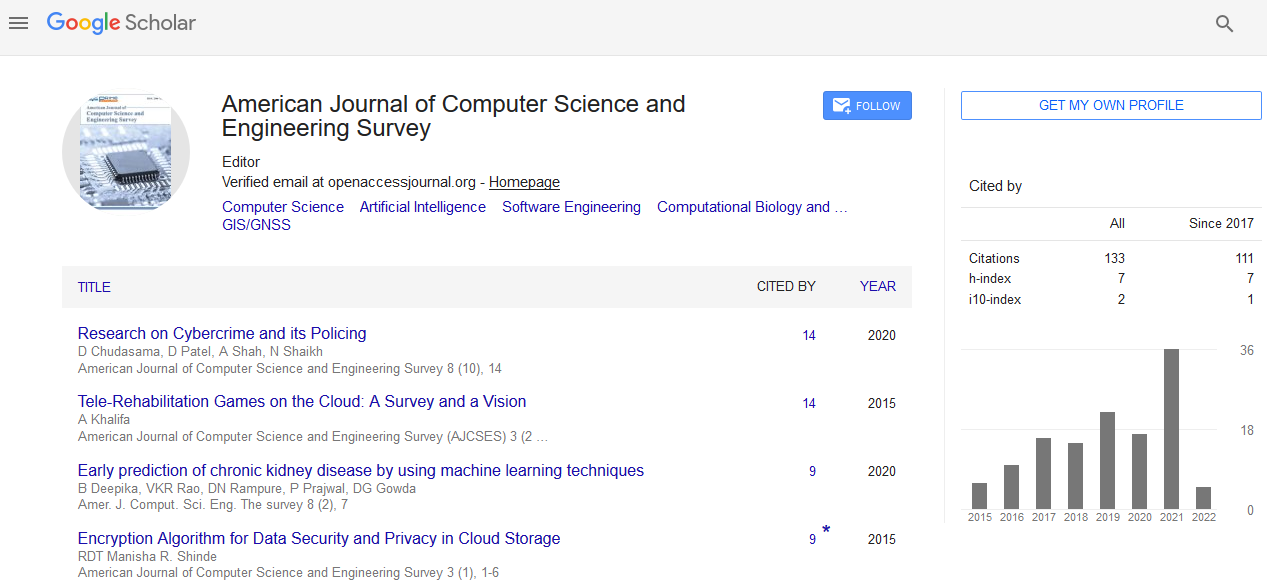Commentary Article - (2024) Volume 12, Issue 2
Artificial Intelligence: A Journey into the Future of Humanity
Asuka Yoshi*
Department of Global Sciences, Meiji University, Japan
*Correspondence:
Asuka Yoshi,
Department of Global Sciences, Meiji University,
Japan,
Email:
Received: 29-May-2024, Manuscript No. IPACSES-24-20622;
Editor assigned: 31-May-2024, Pre QC No. IPACSES-24-20622 (PQ);
Reviewed: 14-Jun-2024, QC No. IPACSES-24-20622;
Revised: 19-Jun-2024, Manuscript No. IPACSES-24-20622 (R);
Published:
26-Jun-2024, DOI: 10.36846/2349-7238.24.12.15
Description
Artificial Intelligence (AI) stands at the forefront of technological
innovation, captivating imaginations and provoking deep
reflections on the future of humanity. Defined as the simulation
of human intelligence by machines, AI encompasses a broad
spectrum of capabilities-from speech recognition and natural
language processing to machine learning and autonomous
decision-making. As we navigate this transformative era, it
is crucial to examine the promises, challenges, and ethical
considerations surrounding AI. AI holds immense promise
across various domains. Enhanced efficiency and productivity:
AI-powered automation streamlines processes, reduces
operational costs, and improves efficiency in industries ranging
from manufacturing and logistics to healthcare and finance.
Innovation and discovery: Machine learning algorithms
analyze vast datasets to uncover insights, accelerating scientific
research, drug discovery, and technological advancements.
Personalization and user experience: AI enables personalized
recommendations in e-commerce, customized healthcare
treatments, and intuitive user interfaces that adapt to individual
preferences. Safety and security: AI enhances cybersecurity
through anomaly detection, threat prediction, and real-time
monitoring, safeguarding digital infrastructures from evolving
threats. However, the rapid advancement of AI also presents
significant challenges and ethical dilemmas. Job displacement:
Automation driven by AI technologies may disrupt traditional
job markets, necessitating retraining and adaptation for the
workforce. Bias and fairness: AI algorithms can perpetuate biases
present in training data, leading to unfair outcomes in areas
such as hiring practices, criminal justice, and loan approvals.
Privacy concerns: The proliferation of AI-enabled surveillance
and data collection raises concerns about individual privacy
and data security. Ethical use of AI: Questions surrounding the
ethical use of AI in military applications, autonomous vehicles,
and decision-making processes require careful consideration
of accountability, transparency, and human oversight. Despite
these challenges, the future of AI is not one of human versus
machine but rather of symbiotic collaboration. AI systems
augment human capabilities, enabling us to tackle complex
challenges, make more informed decisions, and unlock new
frontiers of knowledge and innovation. The integration of AI into
everyday life-from smart assistants and healthcare diagnostics
to personalized learning platforms-illustrates its potential to
enhance human well-being and quality of life. To harness the
full potential of AI while mitigating risks, policymakers, industry
leaders, and researchers must collaborate to establish robust
governance frameworks. These frameworks should prioritize
ethical guidelines, data privacy protections, and mechanisms
for accountability and transparency in AI development and
deployment. As AI technologies continue to evolve, embracing
a forward-thinking approach that balances innovation with
ethical considerations will be essential. Educating the public
about AI, fostering interdisciplinary collaboration, and
promoting responsible AI research and development are
crucial steps toward shaping a future where AI contributes
positively to society. Artificial Intelligence (AI) stands at the
forefront of technological innovation, captivating imaginations
and provoking deep reflections on the future of humanity.
Defined as the simulation of human intelligence by machines,
AI encompasses a broad spectrum of capabilities-from speech
recognition and natural language processing to machine
learning and autonomous decision-making. As we navigate
this transformative era, it is crucial to examine the promises,
challenges, and ethical considerations surrounding AI. Artificial
intelligence represents both a technological frontier and a
philosophical challenge-a journey into the unknown realms
of intelligence and consciousness. By navigating this journey
with foresight, collaboration, and ethical integrity, we can
harness AI’s potential to create a more inclusive, innovative,
and sustainable future for all humankind.
Acknowledgement
None.
Conflict Of Interest
None.
Citation: Yoshi A (2024) Artificial Intelligence: A Journey into the Future of Humanity. Am J Comp Science. 12:15.
Copyright: © 2024 Yoshi A. This is an open-access article distributed under the terms of the Creative Commons Attribution License, which permits unrestricted use, distribution and reproduction in any medium, provided the original author and source are credited.

